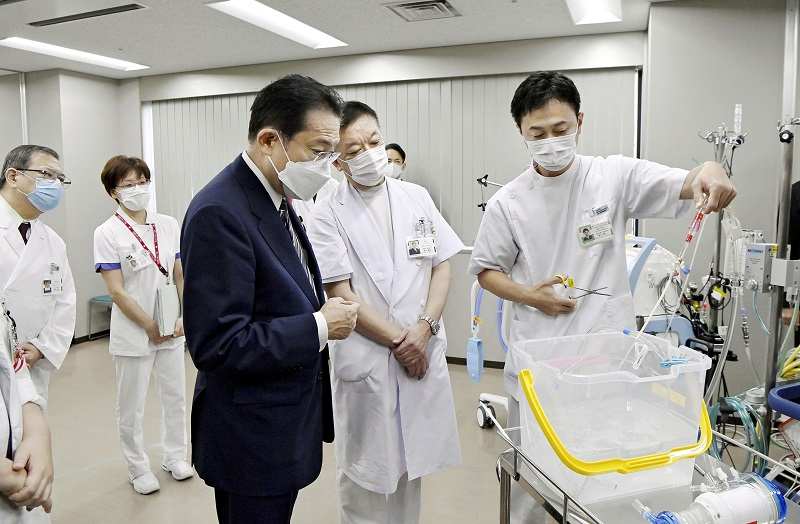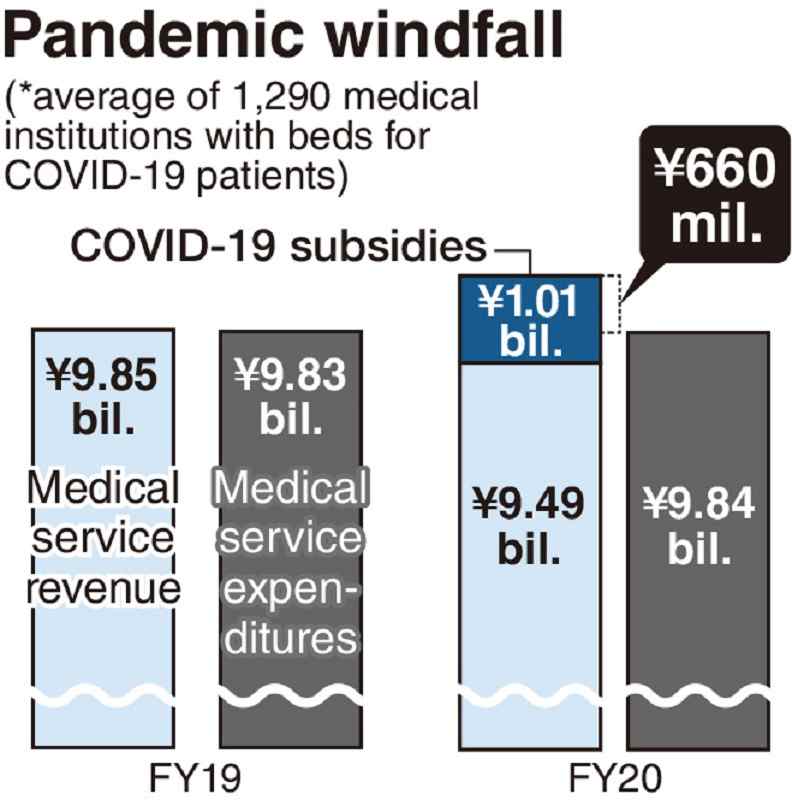
Prime Minister Fumio Kishida listens to a clinical engineer explain the ECMO procedure at the Tokyo Metropolitan Bokutoh Hospital, which accepts COVID-19 patients, in Sumida Ward, Tokyo, on Saturday.
16:06 JST, October 12, 2021
Coronavirus-related subsidies led to an average profit of ¥660 million in fiscal 2020 for medical institutions that secured beds for COVID-19 patients, according to data compiled by the health ministry.
During the states of emergency, the government provided ¥19.5 million per bed for seriously ill COVID-19 patients and ¥9 million per bed for patients with less severe symptoms.
The central government paid subsidies to medical institutions that secured the beds in line with requests from prefectural governments.
The financial data was obtained by the Health, Labor and Welfare Ministry through surveys sent to 1,715 hospitals that received the subsidies, with 1,290 of them responding. The report was delivered to a subcommittee of the Finance Ministry’s Fiscal System Council on Monday.
According to the report, the hospitals’ average medical service revenue was ¥9.49 billion, down ¥360 million from fiscal 2019, partly because many people refrained from going to hospitals amid the pandemic. The average medical service expenditures, however, was almost unchanged at ¥9.84 billion, up ¥10 million.
As a result, the hospitals’ average medical service balance before subsidies was ¥350 million in the red. With subsidies, the balance turned a ¥660 million profit. In fiscal 2019, the average medical service profit was ¥20 million.
Looking at 140 state-run hospitals, 94 of them accept COVID-19 patients. These institutions received an average of ¥1.01 billion in subsidies and their final financial balance on average was ¥640 million in the black, compared to just ¥10 million in fiscal 2019.
Among all hospitals that have received the subsidies, there have been cases where it was difficult for them to accept COVID-19 patients due to reasons such as a shortage of nurses or difficulty in ensuring separate passageways for such patients.
“Each medical institution has its respective situation, thus we cannot immediately say there are problems. It is necessary, however, to examine the cost-effectiveness of the subsidies,” a Finance Ministry official said.
Concerns over the shortage of hospital beds have eased as the number of newly confirmed coronavirus cases declines, but fiscal authorities hope to clarify how public subsidies should be provided in preparation for another wave of infections.

Unanswered questions linger
Frequently during the pandemic, there were cases in which there were no hospitals in a given area that would accept COVID-19 patients.
In light of this fact, the possibility remains that providing fixed subsidies per bed has not resulted in the expected effect of securing a sufficient number of hospitals where COVID-19 patients can be admitted.
If the report indicates that subsidies to hospitals that accept COVID-19 patients was sufficient in terms of monetary amount, why has the effect been less than sufficient?
Isn’t it necessary to examine the issue by precisely checking details such as the size of hospitals, the management entities and the local situations?
There are many hospitals that were concerned about the difficulty in having doctors and nurses on hand who could deal with COVID-19 cases, even if they wanted to accept patients.
What kind of policies are effective for securing hospital beds that can actually help to admit more patients?
To prepare for the next possible spread of the infection, more effective measures must be considered.
Top Articles in Society
-

Man Infected with Measles Reportedly Dined at Restaurant in Tokyo Station
-

Man Infected with Measles May Have Come in Contact with Many People in Tokyo, Went to Store, Restaurant Around When Symptoms Emerged
-

Woman with Measles Visited Hospital in Tokyo Multiple Times Before Being Diagnosed with Disease
-

Australian Woman Dies After Mishap on Ski Lift in Nagano Prefecture
-

Foreign Snowboarder in Serious Condition After Hanging in Midair from Chairlift in Nagano Prefecture
JN ACCESS RANKING
-

Japan PM Takaichi’s Cabinet Resigns en Masse
-

Japan Institute to Use Domestic Commercial Optical Lattice Clock to Set Japan Standard Time
-

Israeli Ambassador to Japan Speaks about Japan’s Role in the Reconstruction of Gaza
-

Man Infected with Measles Reportedly Dined at Restaurant in Tokyo Station
-

Videos Plagiarized, Reposted with False Subtitles Claiming ‘Ryukyu Belongs to China’; Anti-China False Information Also Posted in Japan






















